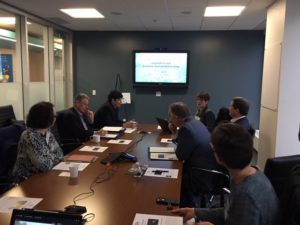
Policy Briefing Series: Land Reform and Economic Development in China

Washington State China Relations Council

WSCRC convened its 37th Annual Banquet on March 15, 2017 at the Bell Harbor Conference Center in Seattle. More than 260 guests representing key sectors – aerospace, agriculture, architecture, banking, bio-tech, clean-tech, hi-tech, investment, law, manufacturing, real estate, shipping, etc. – as well as national, state and local government attended the event. Watch video highlights here.
The program began with welcome remarks from Port of Seattle Commission President Tom Albro, who introduced newly-appointed WSCRC Chairman Andy Wilson. The new chairman outlined WSCRC’s new vision to amplify Washington state’s national voice and visibility on the role of Washington state in US-China trade relations and more broadly, advocate equitable globalization. Andy Wilson then introduced newly-appointed WSCRC President Mercy A. Kuo.
The banquet featured keynote speaker Ambassador Carla A. Hills – Chairman and CEO, Hills & Company International Consultants; Chair, National Committee on U.S.-China Relations; Co-Chair, Council on Foreign Relations; and U.S. Trade Representative (1989-1993) – addressed the future of US-China trade relations. Ambassador Gary Locke introduced Ambassador Hills and then both ambassadors exchanged their views on the new US administration’s plans to renegotiate North American Free Trade Agreement (NAFTA) and reconsider the rules of the World Trade Organization (WTO).
When asked what would happen if the US decides to circumvent rules in the WTO and exercise American sovereignty, Ambassador Hills replied, “If we tear up the WTO, we would be out in the jungle! The law of the jungle would preside. Our average tariffs are two percent. Some countries we trade with put 50 percent tariffs on US products. If we did not have WTO rules to protect us, then they would retaliate, and we would counter. We would be in a very bad situation with trade wars brewing, and the economy would be a mess.”
Ambassador Hills underscored four critical factors in the framing the future of US-China trade relations:
Government representatives also shared their views on US-China trade relations:
Brian Surratt, Director of Economic Development, Office of the Mayor of Seattle highlighted the WSCRC’s role in preparing Mayor Ed Murray’s 2016 delegation to China, including key Chinese cities – Shenzhen and Hangzhou, and Hong Kong. Surratt noted that Xiamen Airlines, Vanke (real estate developer), and BGI (world’s largest genome bank) have opened first offices in Seattle.
Brian Bonlender, Director of the Washington State Department of Commerce, underscored that WSCRC is critical in these times of uncertainty in US-China relations. Since the United States entered WTO 20 years ago, now is a good time to review and improve our work around trade with China – intellectual property protection, state run companies are subject to regulations of private, environmental protection, and personal data protection. Governor Jay Inslee has lifted the travel ban, drastically ramping up business development work for the state. Department of Commerce will be in 10 different countries around the world, and will implement international attraction and trade promotion plan. Washington state has led the country in export program. 71 opportunities and 6,000 jobs in business development. Governor Jay Inslee is planning a visit to China in August. The Commerce Department in collaboration with the Chinese Ministry of Commerce are planning an inbound investment forum in fall 2017 in Seattle.
Yang Yihang, Economic and Commercial Counselor, People’s Republic of China Consulate General in San Francisco noted that in the past 30 years, economic relations between China and the United States have developed rapidly. In 2013, bilateral trade reached USD 519 billion – 207 times the volume of 1979. China has become the US’s biggest trade partner. In 2017, Chinese company’s direct investment in the US had increased 132 percent to USD 19.5 billion. US companies’ investment in China grew by 52 percent. Companies from both sides are optimistic. Counselor Yang emphasized that China – Washington economic relations are unique. In 2016, trade between China and Washington state reached USD 20 billion. In exports to China, Washington ranks first among US states. He affirmed that it is mutually beneficial for two sides to cooperate, and Washington state is leading the way.
Dr. Vikram Jandhyala, Vice President for Innovation Strategy at the University of Washington highlighted the University’s collaboration with Tsinghua University in China on Global Innovation Exchange (GIX) – a global incubator to develop in-depth perspective on technological innovation.
WSCRC also honored Robert A. Kapp with the Sidney Rittenberg Award for unique leadership in advancing US-China relations. Stanley Barer, co-founder of WSCRC, presented the Sidney Award to Bob Kapp for his service as WSCRC executive director from 1979-1987 and 1992-1994.
Washington State China Relations Council
1301 5th Avenue, Suite 1500 Seattle, WA 98101-2611
Tel: (206) 441 - 4419
E-mail: info@wscrc.org